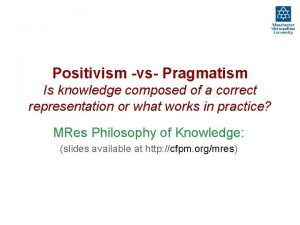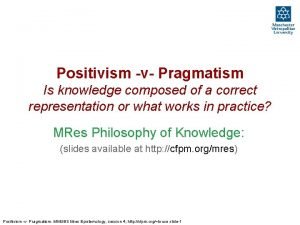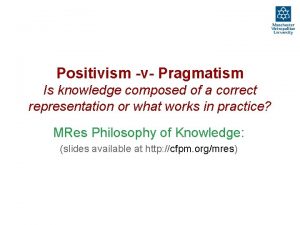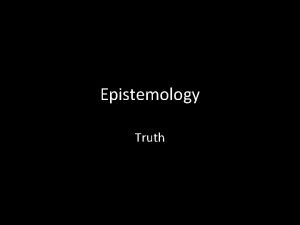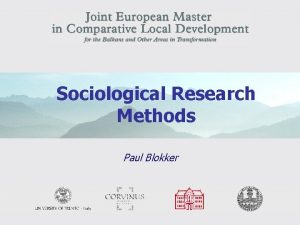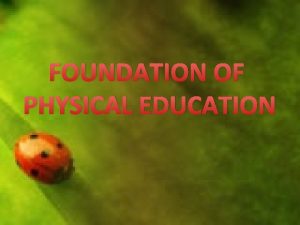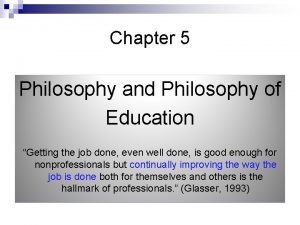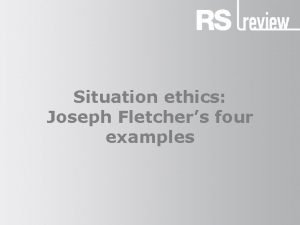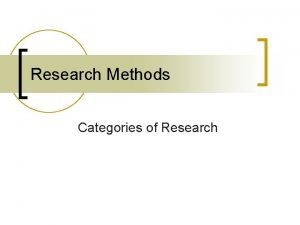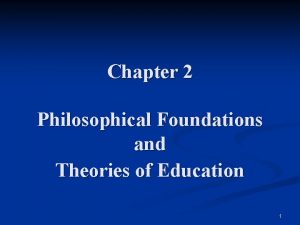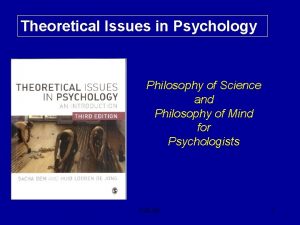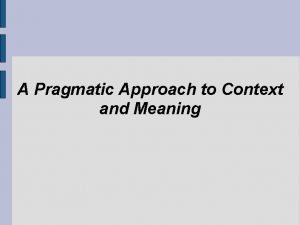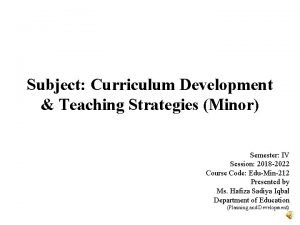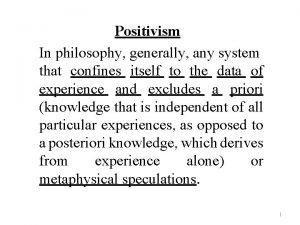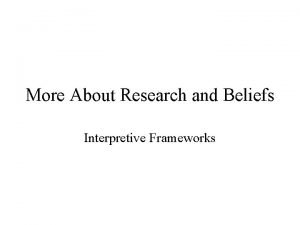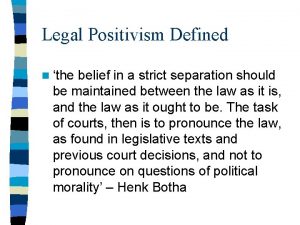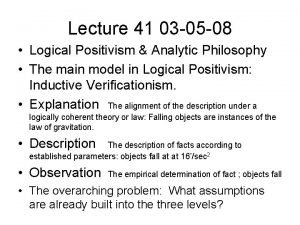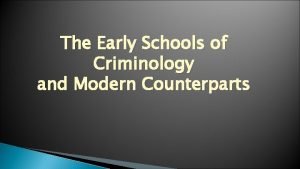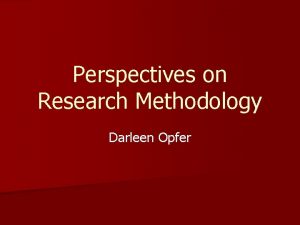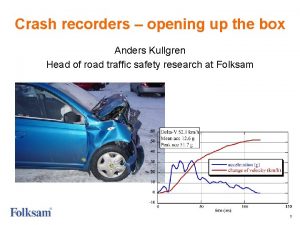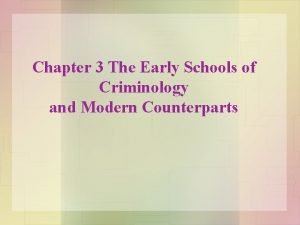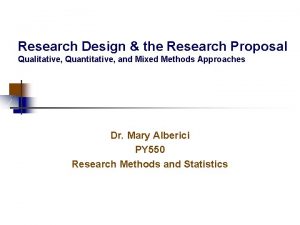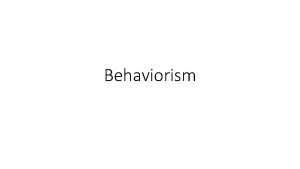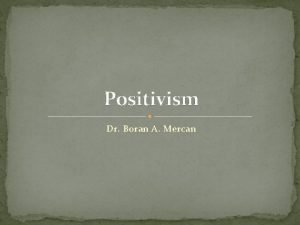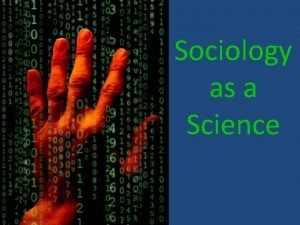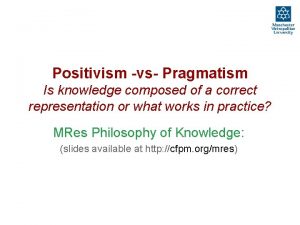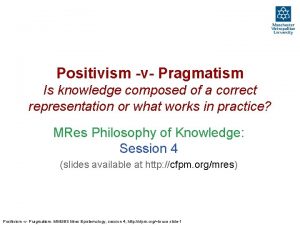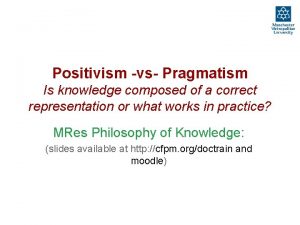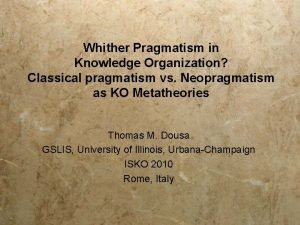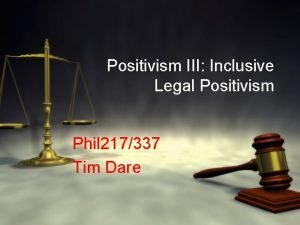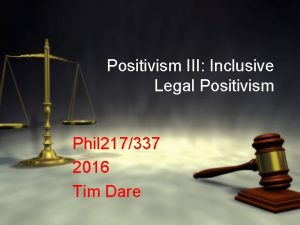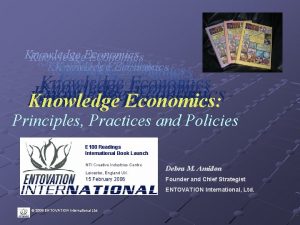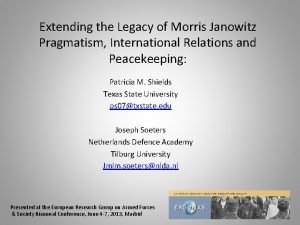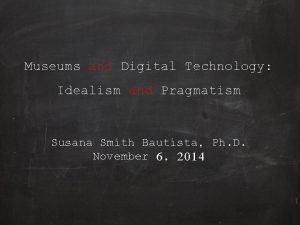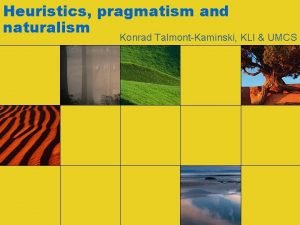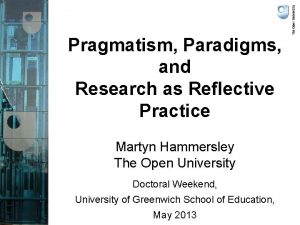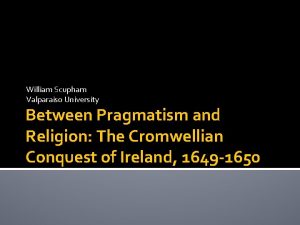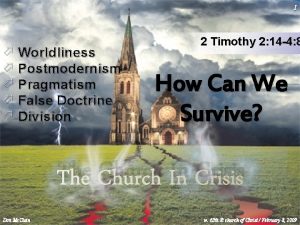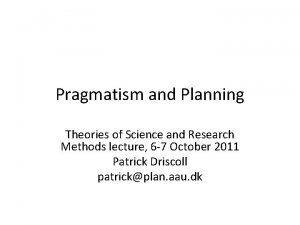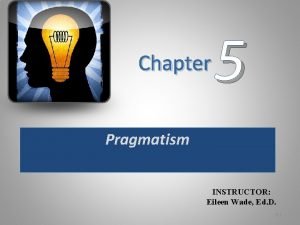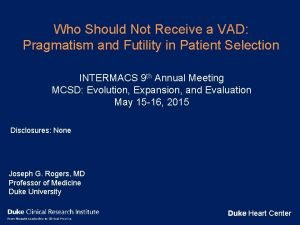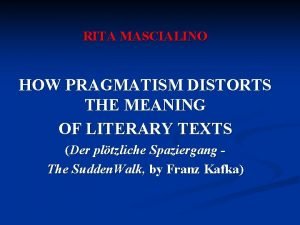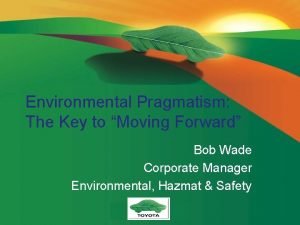Positivism vs Pragmatism Is knowledge composed of a


























- Slides: 26

Positivism -vs- Pragmatism Is knowledge composed of a correct representation or what works in practice? MRes Philosophy of Knowledge: (slides available at http: //cfpm. org/mres)

Some Questions • If someone believes they are being bullied, does this make this true? • If believing that always entering a room with the left foot is a good idea helps, does this make it true? • Is truth relative to the culture you are from? • If something works reliably, then must it be somehow based on some truth or other? • Is there any other method of getting to what is true other than comparing our ideas to what we observe and judging them as a result? • Is Truth a useful idea? If so, what is the idea of truth useful for? If not, then how can we say we know anything? Positivism -v- Pragmatism. MMUBS Mres Epistemology, http: //cfpm. org/~bruce slide-2

Positivism • A denial of the usefullness of metaphysics • The scientific method is the method that results in reliable knowledge • Sometimes associated with empiricism • Originally (Comte) a reaction to religious dogma and to enable a new society • Often used as a “straw man” to define what “we” are against • Many different versions of positivism Positivism -v- Pragmatism. MMUBS Mres Epistemology, http: //cfpm. org/~bruce slide-3

Why one might be ‘Positivist’ • Avoids self-deception, weasel words • Looks towards independent, objective standards for truth • Comparing ideas to objective data is frequently simply sensible • If evidence contradicted theory, why would one ever trust theory again? • It can help take cultural and religious biases out of science • Context independent and reliable knowledge is useful, if obtainable Positivism -v- Pragmatism. MMUBS Mres Epistemology, http: //cfpm. org/~bruce slide-4

Pragmatism I (Peirce, James, Dewey) • Truth characterised by its consequences in terms its usefulness for something • Anti-skeptic – importance of doubt • Truth cannot be defined as the correspondence of thought with reality • Our truth is not a copy of Absolute Truth • Rather meaning is defined by use • How truth is discovered and how it is used are important • An interactionist approach – truth comes from the interaction of symbols with the world Positivism -v- Pragmatism. MMUBS Mres Epistemology, http: //cfpm. org/~bruce slide-5

Dewey on Pragmatism (1907) Pragmatism asks its usual question. "Grant an idea or belief to be true, " it says, "what concrete difference will its being true make in anyone's actual life? How will the truth be realized? What experiences will be different from those which would obtain if the belief were false? What, in short, is the truth's cash-value in experiential terms? " Positivism -v- Pragmatism. MMUBS Mres Epistemology, http: //cfpm. org/~bruce slide-6

Pragmatism II (Quine, Putnam, Rorty) • With the linguistic turn moves from a concern about the truth of theory to the nature of language – There is no thing that makes a statement true • Denial of the analytic-synthetic distinction • We are “trapped” within language “questions which we should have to climb out of our own minds to answer should not be asked” (Rorty) • Questions of truth and meaning are contingent and must be answered in their context • Theories are ultimately justified by the extent to which they enable people to attain their aims Positivism -v- Pragmatism. MMUBS Mres Epistemology, http: //cfpm. org/~bruce slide-7

Why one might be a Pragmatist • Ultimately we need to be effective in what we do, so it makes sense to judge theories/ideas in this way • Philosophical accounts of Truth or what is Good have not been very helpful, are divorced from everyday reality • It is difficult to see how a theory could work well without being true in some sense • Almost any question about truth can be recast into one of usefulness • Some truth might be very context- or culturaldependent • Universal truths are often not very useful Positivism -v- Pragmatism. MMUBS Mres Epistemology, http: //cfpm. org/~bruce slide-8

An Exercise • It is good to be polite • All living things have at least some rights • There are some things which are bad to talk about in public – If they are useful, in how • A leader should be many different ways are respected, unless there they so? is strong evidence – If they are not useful, then otherwise how might one know if • Democracy should be they are true? the aim for all nations • Children should not watch pornography In small groups, for the examples on the right… • Decide whether (broadly) you think they are true • Decide whether they are useful Positivism -v- Pragmatism. MMUBS Mres Epistemology, http: //cfpm. org/~bruce slide-9

The Traditional (‘hard’) Sciences Tend to… • Use mathematics • Use numerical data and measurement • Use evidence only to judge their theories (not so much to form them) • Are objective • Are reliable (on the whole) • Are reductionist – explaining what they observe in terms of simpler things • Consider their truths to be of a higher quality than other kinds of truth • Produce useful knowledge • Will (eventually) determine the truth in all subjects How many of these are really necessary to a science? Positivism -v- Pragmatism. MMUBS Mres Epistemology, http: //cfpm. org/~bruce slide-10

Quantitative -v- Qualitative Several senses - whether something is expressed/represented: Precise distinction 1. Using numbers (or symbols for numbers) 2. In semantically rich expressions or in a formal language 3. In an objective positivistic way or in a more humanistic manner Sloppy distinction Positivism -v- Pragmatism. MMUBS Mres Epistemology, http: //cfpm. org/~bruce slide-11

Formal Representation • Any system that expresses something without ambiguity, such that it can be precisely communicated is a formal system • Analogies, pictures, most natural language, art, most political statements are not formal • Games, legal systems, mathematics, logic, computer programs are formal • Often formal systems come with rules for working with them, working out their consequences • But formal systems require explicit maps to other things if they are to have meaning • Numbers are just one example of formal representation • Although they can be used to represent a range of formal systems (counting, flows, a ranking, unique labels) Positivism -v- Pragmatism. MMUBS Mres Epistemology, http: //cfpm. org/~bruce slide-12

Another Exercise In small groups, determine which of the list on the right is formal • If it is not formal, then could one make a formal system to capture it? • If it is formal, then are there some aspects of it that evade formality? • A social network • The degree to which one agrees with a statement • The mark one gets for a Philosophy assignment • The popularity of a certain TV show • A system of greetings in a given culture • A description of basic family relationships (sister, mother, aunt etc. ) Positivism -v- Pragmatism. MMUBS Mres Epistemology, http: //cfpm. org/~bruce slide-13

Example: Logical Positivism • Only two sources of knowledge: – Logical reasoning (analytic a priori) – Empirical experience (synthetic a posteriori) • No synthetic a priori • Verifiability principle: A statement is only meaningful if it can be proved true or false (in principle) by means of experience • Metaphysics is meaningless • The only role of philosophy is the clarification of the meaning of statements Positivism -v- Pragmatism. MMUBS Mres Epistemology, http: //cfpm. org/~bruce slide-14

Structure in Logical Positivism Four main tennents (according to Reichenbach and Carnap) • the distinction between observational and theoretical terms • the distinction between synthetic and analytic statements • the distinction between theoretical axioms and rules of correspondence • the deductive nature of scientific theories Positivism -v- Pragmatism. MMUBS Mres Epistemology, http: //cfpm. org/~bruce slide-15

Note about Positivism! • Logical Positivism is only a special kind of positivism, an extreme kind. • Most people who might be characterised as “positivist” are NOT Logical Positivists! • In fact, on the whole, people do not claim to be positivists AT ALL… • …rather it is a label for a “straw man” that anti-positivists (pragmatists, interpretavists etc. ) use for what they are against • Since it is a negative label it may be used for many different kinds of people believing many different things Positivism -v- Pragmatism. MMUBS Mres Epistemology, http: //cfpm. org/~bruce slide-16

Feyerabend and methodological anarchism • Looking back at the history of science one can not find a universal scientific method • Constraints on methodology are counterproductive • Science thrives through methodological anarchism - what happens to work is OK • This links with human freedom • Has been linked to the evolutionary epistomology of Popper et al. Positivism -v- Pragmatism. MMUBS Mres Epistemology, http: //cfpm. org/~bruce slide-17

2 views of learning: (1) feedback via predictive power perception Evaluate whether predicitons were accurate action Model 1 Model 2 Model 3 etc. Positivism -v- Pragmatism. MMUBS Mres Epistemology, http: //cfpm. org/~bruce slide-18 Choose one, work out predictions of effects of possible actions

2 views of learning: (2) feedback via success when used (e. g. pain) perception Evaluate how successful strategy was action Strategy 1 Strategy 2 Strategy 3 etc. Positivism -v- Pragmatism. MMUBS Mres Epistemology, http: //cfpm. org/~bruce slide-19 Choose one and put it into effect (work out what to do)

Some Examples • If parliamentary democracy delivers good government, does it matter whether it truly reflects the will of the people? • Should we seek to ‘understand’ why people commit dreadful crimes or is it more effective to simply condemn it? • If paying criminals turned out to be the cheapest and most effective way of preventing crime, should we do this? • If science showed that people were predictable does that mean we have to reject the idea of ‘free will’? Positivism -v- Pragmatism. MMUBS Mres Epistemology, http: //cfpm. org/~bruce slide-20

Discussion - Examples Positivism -v- Pragmatism. MMUBS Mres Epistemology, http: //cfpm. org/~bruce slide-21

Summary of Pragmatism and Positivism • Positivism originally a reaction against metaphysics and looks towards scientific methods • Now a label mostly used by those who think social science should use different methods against those they disagree with • Pragmatism is the view that one judges statements by their usefulness rather than their truth • Second wave of linguistic pragmatism in late 20 th Century, questioning usefulness of the idea of Truth Positivism -v- Pragmatism. MMUBS Mres Epistemology, http: //cfpm. org/~bruce slide-22

Recap on Truth • Where does truth come from? – A correspondence with reality, however imperfect, difficulty and indirect this may be – Something useful gained from interaction with the world – Something built up in a creative process, either individually or collectively – A simplification of all the detail of what happens at a lower level – Reasoning about knowledge – From perceptions and evidence Positivism is not about Truth, but Method! Positivism -v- Pragmatism. MMUBS Mres Epistemology, http: //cfpm. org/~bruce slide-23 Realism Critical Realism Pragmatism Radical Constructivism Social Constructivism Reductionism Rationalism Empiricism

Some Final Meta-Questions… • Can one choose which philosophical position to take based on what is convenient for oneself? Or what is useful to oneself? • Or is it a matter of conviction? • Does it matter if one does pick&mix from philosophical positions? • Are there limitations on what philosophical positions one can take? • Are some incompatible with others? Positivism -v- Pragmatism. MMUBS Mres Epistemology, http: //cfpm. org/~bruce slide-24

Paradigmatic ‘Hairballs’ Positivism Intepretivism • • • Realist Empiricist Reductionist Belief in Falsification Quantitative Correspondence theory of truth Constructivist Rationalist Holist Confirmatory Qualitative Relativist or Pragmatist theories of truth Which side do you feel sympathy for? What mix holds in your research? Think of examples where some of each side is appropriate? Positivism -v- Pragmatism. MMUBS Mres Epistemology, http: //cfpm. org/~bruce slide-25

The End (as usual slides etc. at: http: //cfpm. org/mres)
 Pragmatism and positivism
Pragmatism and positivism Empiricism vs positivism
Empiricism vs positivism Pragmatism questions
Pragmatism questions Pragmatic theory of truth
Pragmatic theory of truth Pragmatism sociology
Pragmatism sociology Physical activities of the primitive society
Physical activities of the primitive society Perennialism in education
Perennialism in education Fletcher's six fundamental principles
Fletcher's six fundamental principles Pragmatism and constructivism
Pragmatism and constructivism Pragmatism teaching methods
Pragmatism teaching methods Pragmatism theory of truth example
Pragmatism theory of truth example Theory of pragmatism
Theory of pragmatism Sociological foundation of curriculum
Sociological foundation of curriculum What is positivism in philosophy
What is positivism in philosophy Interpretative framework
Interpretative framework Natural law and positive law
Natural law and positive law What is positivism in philosophy
What is positivism in philosophy What is logical positivism in philosophy
What is logical positivism in philosophy Classical school of criminology
Classical school of criminology What is a post positivist approach
What is a post positivist approach Logisk positivism
Logisk positivism Modern school of criminology
Modern school of criminology Appendix example in research
Appendix example in research Positivism behaviorism
Positivism behaviorism Drboran
Drboran Positivism methodology
Positivism methodology Is sociology a science
Is sociology a science
